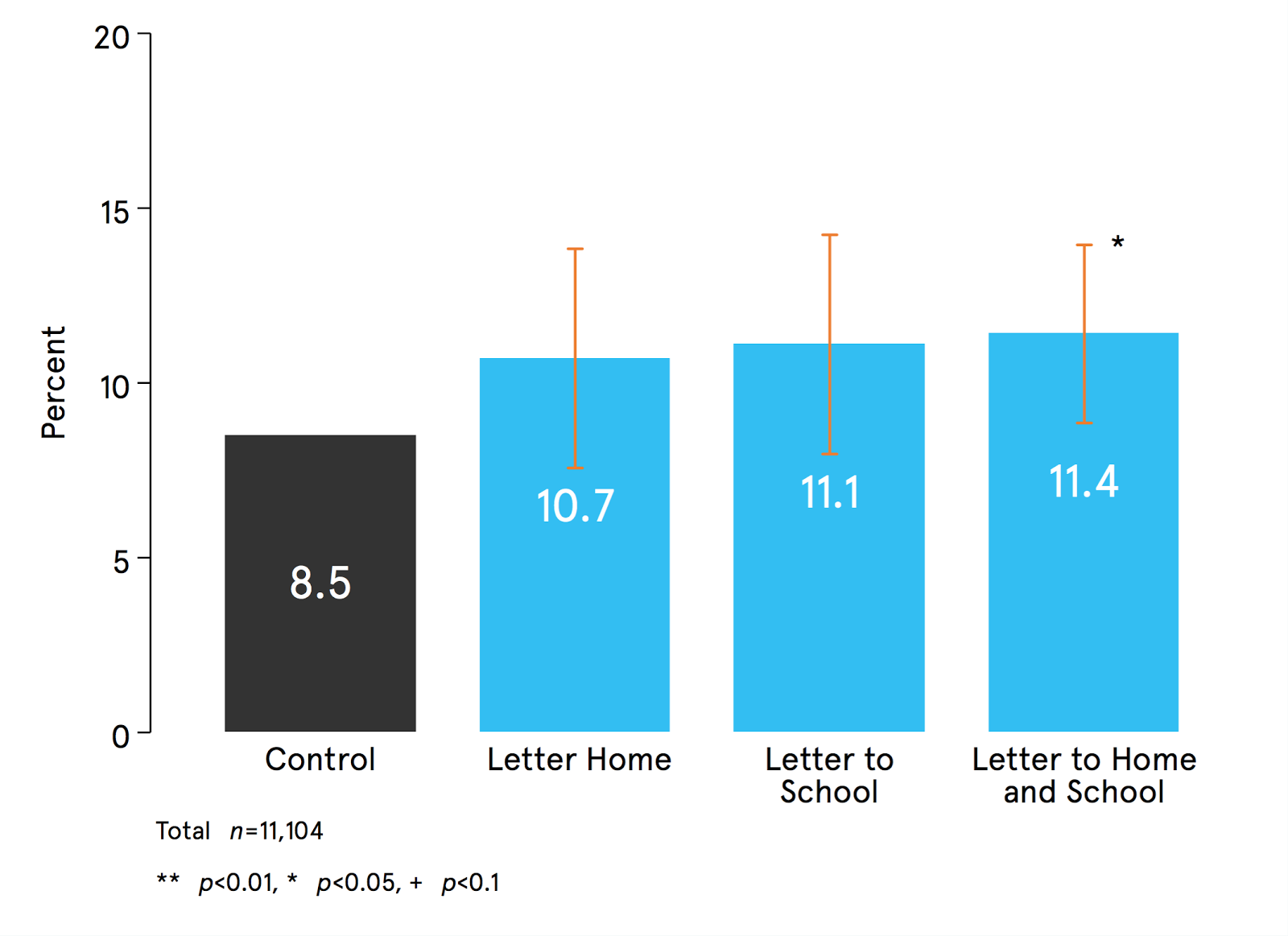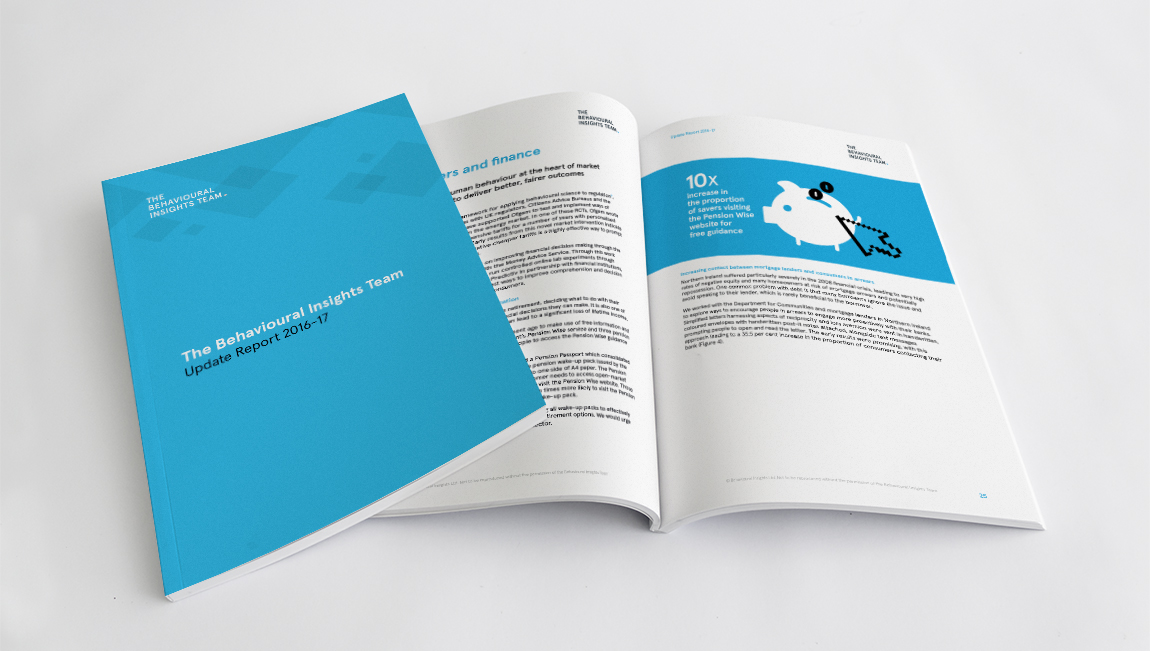A successful education system is one in which everyone is helped to reach their potential. Behavioural science can help us better understand and tackle the barriers that people of all ages face, regardless of the route they choose to pursue.
Today we are sharing with you two results that demonstrate how behavioural insights can have a positive impact in education. One shows how mobilising social support can improve the outcomes of those yet to achieve their GSCEs or functional skills in maths or English, and the second shows how introducing a role model, even in a light touch way can increase the number of students from disadvantaged background being accepted into a selective university.
Study supporters: increasing post-16 English and maths pass rates
Attaining good levels of literacy and numeracy is associated with a reduced risk of economic disadvantage, unemployment and poor health.
To improve outcomes for young people, it is now a condition of funding for schools and colleges to ensure those who failed English and maths at 16 (those that did not receive an A*-C grade) re-sit one or both of the subjects as part of their study programme. However, only one in four of those who re-sit pass at the end of the year, and Further Education colleges, where 50% of re-sit students continue their studies, despite their best efforts, often struggle to improve pass rates. This is because many students are disengaged, lack confidence, and are afraid of continuing the cycle of failure.
Family and friends can be a powerful – and often untapped – resource to shape students’ educational experiences, especially when individuals have grown up without supportive learning environments.
Some young people simply don’t have access to someone who asks them about their learning. Family or friends may not feel confident about their own skills, or know what the student is up to in class. We wanted to change this.
Our trial invited students to nominate a ‘study supporter’ – a parent, older sibling, mentor or friend – to receive regular text messages, written in conjunction with English and maths tutors. These messages prompted the supporters to start regular conversations with the student about their studies: chatting through a recent topic, or encouraging revision for an upcoming test.
Over 1,800 students across 9 further education colleges took part: half their study supporters were sent texts, and half were not. The supportive text messages resulted in a 4.1 percentage point (7%) increase in attendance and 6 percentage point (27%) increase in attainment for students whose study supporters were texted, compared to those who didn’t receive texts.

In other words, in every class of 25 learners who receive the programme, we generated 1 additional GCSE A*-C (grades 9-4 in the reformed system). We’ve shown that targeted outreach to parents, mentors and peers can make a real difference for students, and at a low cost – less than £10 per student for the year.
Role models: encouraging aspiration for young people
Young people from less affluent backgrounds experience worse educational outcomes than their more affluent peers on average. Interestingly, research has shown that people from low income families are less likely to apply to university, even when they get as good grades as their more affluent peers – and even if they do apply, they apply to on average less selective universities.
Some of our previous work found that providing young people with accurate information about the costs and benefits of attending university actually decreased their interest in applying to university, while a talk from a role model like them who had been to university, significantly boosted their likelihood of attending. We wanted to take this work further, and on a larger scale.
Working with the Department for Education, we selected a group of people in Year 12 who had just scored in the top 20% nationally on their GCSEs. They attended schools where most students didn’t go to university, and if they did, they tended to go to the closest university geographically.
These students were divided, based on the school they went to, into four groups:
- Group 1 received what they would have normally received – support from their school, and other campaigns, as well as outreach from universities;
- Group 2 received a letter addressed to them sent to their school in November of Year 12 from a male student at the University of Bristol (Ben) from a background like theirs, encouraging them to attend University, and a selective university in particular;
- Group 3 received a similar letter addressed to the student sent to their home written by a female student (Rachel) in the spring;
- Group 4 received letters from both Ben (this went to the school in November of Year 12) and Rachel (this went to the student’s home in the spring).
At the end of the study we used data from UCAS to see whether students had applied to universities and ultimately accepted an offer. We found modest and not statistically significant impacts on the rate of accepting offers to university, increasing the rate from 28% to 30.6% – an increase of 9.2%.
We found more striking increases in the rate of people applying to selective Universities like the Russell Group, with 8.5% of students in Group 1 accepting offers from one of these selective Universities, compared to 11.4% of students from Group 4 – an increase of 34% (this was statistically significant).

What we found particularly interesting was the different effects depending on the students’ circumstances. The letters are most effective on students who are at schools which generally perform poorly (those with low Progress 8 scores), and are almost ineffective for students at high performing schools.
We also see that the letter from Ben is more effective for male students than for female students, for whom it doesn’t seem to have any impact by itself, suggesting that the closer a role model is to us (in this case in terms of gender), the more effective they could be.
Our sincere thanks to all who helped with and participated in these trials, and particularly our colleagues Bibi Groot and Eliza Selley.
Interested in setting up a study supporter programme at your school or college? Register your interest with Promptable and we’ll be in touch.






